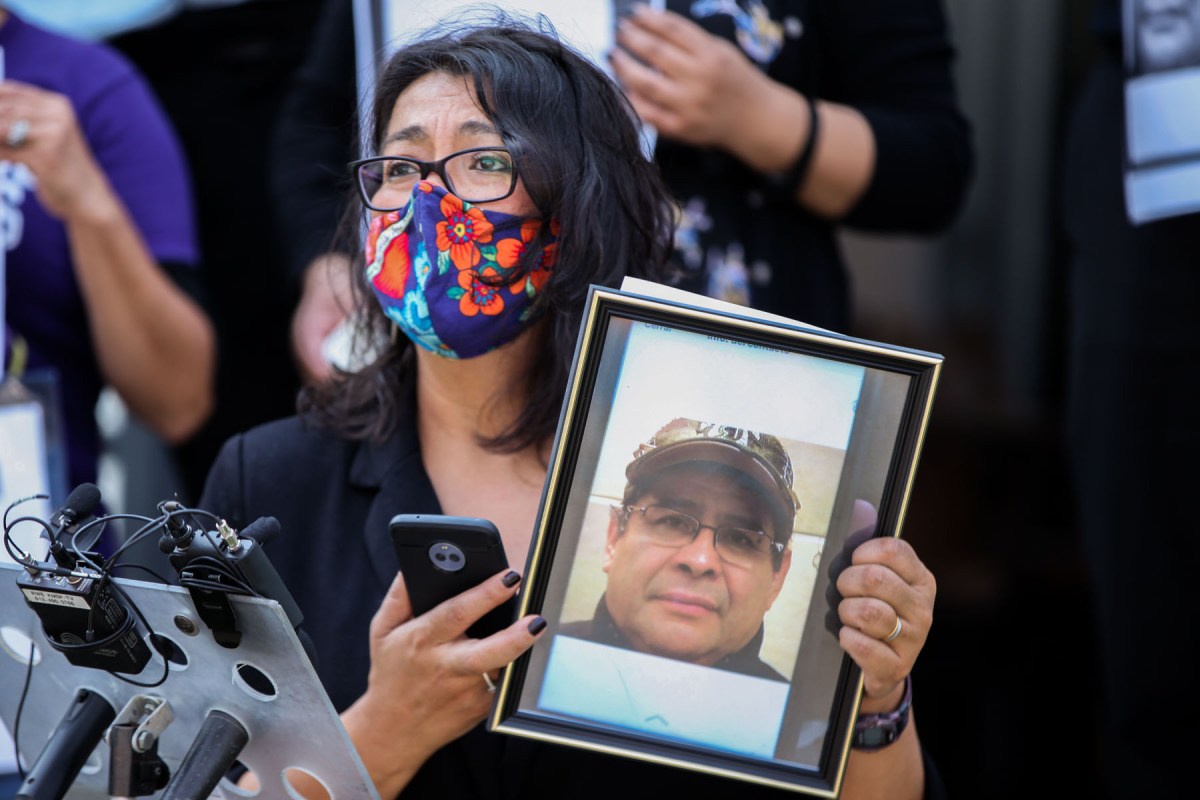
Sahan Journal’s health coverage is supported in part by a generous gift from Delta Dental of Minnesota. You can become a Sahan sponsor, too.
For three years, Abdi Haybe worked near Lorenzo Palma during the nightly janitorial shift, in two of the Ameriprise Financial buildings in downtown Minneapolis.
Abdi, *a security guard with a different company, sometimes shared breaks alongside Palma, and described him as always cheerful and “absolutely cool.” If Palma was feeling sick during their last meeting in June, Abdi said he didn’t notice.
Palma suddenly disappeared from work around that time. Abdi, and Palma’s cleaning coworkers, didn’t learn that he had been infected with COVID-19 until roughly one month later. On Aug. 3, Palma died of complications from the virus.
Abdi and a half dozen other members of Service Employees International Union Local 26—which represents janitors, security guards and window cleaners—mourned Palma’s death in a Monday afternoon vigil. They also called for greater coronavirus workplace protection from Palma’s employer, Harvard Maintenance; from Ameriprise; and from city government.
The workers stood on the front steps of the union hall, in Northeast Minneapolis, each holding portraits of Palma. The union members observed a moment of silence for him as the August sun beat down and construction noise from down the block blared in the background.
Abdi and the other union members at the vigil acknowledged that they couldn’t definitively connect Palma’s infection to his workplace. But they cited statistics showing a higher rate of infection in their membership—mostly immigrants and all frontline workers—compared to the general state population.
They expressed concerns that these higher infection rates could stem in part from inadequate personal protective equipment, poor social distancing enforcement and low transparency about infected coworkers.
“How many people have to die for our bosses and government to step up?” said Abdi, 33, during the vigil.
Gloria Kiffmeyer, director of human resources at Harvard Maintenance, told Sahan Journal that the company was “extremely saddened” to learn of Palma’s death earlier this month.
“He was one of our employees,” she said. “All of us are deeply saddened that he passed. It’s a hard time right now.”
Kiffmeyer said Palma started feeling ill about *two weeks after he went on vacation, where she said he tested positive for the virus. Like the union, Kiffmeyer said the company does not know where or how Palma contracted the virus.
Ameriprise, the building occupant, did not immediately respond to voicemails and emails from Sahan Journal seeking comment on the death.
Like Abdi, who immigrated to the U.S. from Somalia in 2003, Palma was also an immigrant. He came to Minnesota from Mexico in 1997 to better support his family, according to his daughter Sandra Palma, who lives in Nebraska. She spoke to reporters at the vigil over the phone. Palma was 66 years old when he died.
Sandra described her father as a worker for his entire life. At the beginning of the pandemic, Governor Tim Walz classified janitors as essential workers, and her father stayed on the job. He grew worried about getting infected during the pandemic’s spread in the spring.
“All that we’ve had, as far as solidarity, is my father’s affiliation with the union,” Sandra said. The union, she added, supported her family through a “solidarity fund” during his sickness.
Since Palma died earlier this month, the family set up a GoFundMe page asking for donations for funeral expenses and to support the family.
Janitors and other frontline workers ‘have no option to work remotely’
Though SEIU Local 26 president Iris Altamirano did not have an exact number, she said the “vast majority” of the union local’s 8,000 members come from immigrant backgrounds. Of the more than 4,000 janitors who are members, about 3 percent have been infected with COVID-19, she said—a higher number than the 1 percent infection rate in Minnesota’s general population.
Part of this is because so many immigrants are frontline workers “who have no option to work remotely,” she said.
“The numbers alone are telling us that we are bearing the brunt of this virus,” Altamirano said.
Palma’s death follows the April virus-related death of Armando Solis, a 55-year-old janitor who worked at U.S. Bank Plaza in downtown Minneapolis. Solis also originally came from Mexico and, through his work in Minneapolis, supported his children in California and Mexico, including one who uses a wheelchair.
In June, the union local surveyed its members and found that 73 percent were worried about exposure to COVID-19 at work, 40 percent did not have access to masks and 45 percent weren’t being trained on the job to protect themselves from the virus.
The union has a list of several demands to address the situation, including mandatory temperature checks of all employees and access to tests and vaccines, once they become available.
Kiffmeyer said that Harvard Maintenance is following CDC protocol to protect its employees, which includes giving them masks and gloves, and enforcing social distancing.
“We are following all guidelines that are out there,” she said.
SEIU also wants the city of Minneapolis to create an “essential worker council” that would assist the city government on developing guidelines to protect workers from the virus.
Based on the union contract, full-time janitors at Harvard Maintenance make a minimum of $17.17 per hour, with access to health insurance. Sandra Palma said her father didn’t have life insurance.
*Correction and clarification: An earlier version of this story was unclear about the relationship between Abdi Haybe and Harvard Maintenance. Abdi is a contract security guard in the Ameriprise Financial buildings and is not an employee of Harvard Maintenance. The same union, Service Employees International Union Local 26, represented both Abdi and Lorenzo Palma.
Gloria Kiffmeyer, director of human resources at Harvard Maintenance, spoke mistakenly when she told Sahan Journal that Palma’s infection came two weeks before his vacation. She intended to say Palma fell ill two weeks after.



